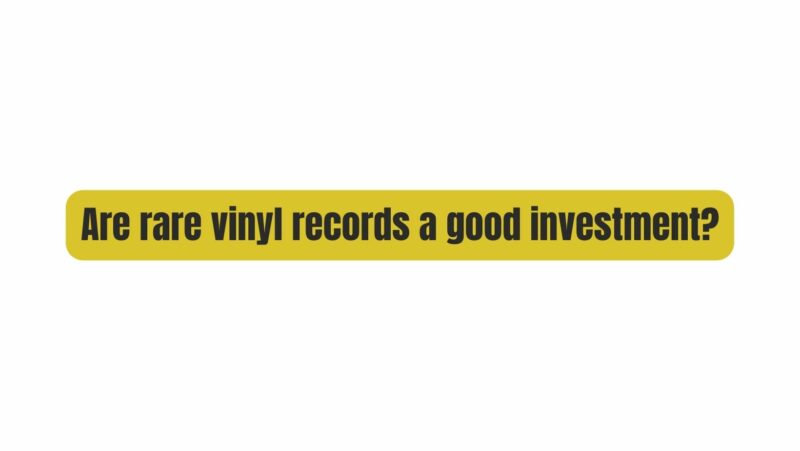In a world of ever-evolving investment opportunities, vinyl records have emerged as a unique alternative for those seeking to diversify their portfolios. The question on the minds of many prospective investors is whether rare vinyl records are a good investment choice. In this article, we will delve into the captivating realm of vinyl collectibles, exploring the factors that influence their investment potential.
The Resurgence of Vinyl Records
Before we dive into the investment aspects, let’s understand why vinyl records have made a remarkable comeback. In an era dominated by digital music streaming, the resurgence of vinyl records seems paradoxical. However, this revival is rooted in the following factors:
- Nostalgia: Vinyl records evoke feelings of nostalgia for many music enthusiasts who grew up with them. The tactile experience of handling a vinyl disc and the analog warmth of the sound appeal to those seeking a connection to a bygone era.
- Collectibility: Collecting vinyl records has become a hobby for many, and the hunt for rare and limited-edition releases adds an element of excitement.
- Audiophile Appeal: Audiophiles appreciate the superior sound quality of vinyl records, which they believe captures the essence of the music more authentically than digital formats.
- Tangible Value: Vinyl records offer a tangible asset, unlike digital investments, which are entirely virtual. Collectors can physically hold and enjoy their investments.
What Makes Vinyl Records Rare?
Rare vinyl records are characterized by their scarcity and desirability among collectors. Several factors contribute to a record’s rarity:
- Limited Pressings: Records produced in small quantities, often marked with specific numbers, are inherently rare. Limited edition releases are highly sought after.
- Historical Significance: Records tied to significant cultural or historical events or anniversaries can become rare and valuable over time.
- Artists and Bands: Records from iconic or influential artists and bands are more likely to become rare and appreciated by collectors.
- Errors and Misprints: Records with production errors, misprints, or unique variations can be considered rare.
- Promotional Copies: Promo copies distributed to industry insiders or radio stations can become rare collector’s items.
Factors Influencing Investment Potential
While rarity is a key factor, several other elements come into play when determining whether a vinyl record is a good investment:
- Condition: The condition of the record and its sleeve significantly affects its value. Records in mint condition are more desirable and command higher prices.
- Demand: The demand for a particular artist, album, or genre can fluctuate over time, influencing the market price of vinyl records.
- Market Trends: Like any investment, vinyl records are subject to market trends. Certain genres or artists may experience surges in popularity, affecting their value.
- Authenticity: Ensuring the authenticity of a rare vinyl record is crucial. Counterfeits and reproductions can devalue an investment.
- Cultural Significance: Records associated with cultural icons or movements may hold enduring value due to their historical and cultural significance.
- Age: Older records may become rare simply due to the passage of time, especially if they are well-preserved.
Vinyl Records as Tangible Investments
One of the unique aspects of investing in vinyl records is the tangible nature of the asset. Unlike stocks or cryptocurrencies, vinyl records are physical objects that can be displayed and enjoyed. Collectors often develop deep connections to their vinyl collections, making them more than just financial investments.
The Role of Grading and Certification
Professional grading services have emerged to provide objective assessments of a vinyl record’s condition. These services offer a standardized way to evaluate records and assign grades that can affect their market value. Additionally, certification from recognized experts can add credibility to the authenticity and value of a record.
Diversification and Risk Management
Investing in rare vinyl records should be part of a diversified investment strategy. Like any collectible, the value of vinyl records can be subject to fluctuations and market trends. To mitigate risk, consider a diversified portfolio that includes traditional financial assets.
Conclusion: The Investment Appeal of Rare Vinyl Records
In the end, the question of whether rare vinyl records are a good investment doesn’t have a one-size-fits-all answer. Investing in vinyl records can be rewarding, both financially and personally, for those who have a passion for music and collecting. However, it’s essential to approach vinyl record investments with a well-researched and cautious mindset.
If you have a genuine love for music and enjoy the hunt for rare gems, vinyl record collecting can be a gratifying and potentially profitable endeavor. Just remember that the true value of rare vinyl records extends beyond their price tags, encompassing the joy, nostalgia, and cultural significance they bring to collectors worldwide.
As with any investment, it’s crucial to do your research, stay informed about market trends, and consult with experts if necessary. Whether you’re a seasoned collector or a newcomer to the vinyl world, the journey of vinyl record investing can be as enriching as the returns it yields.
Invest wisely, and let the music play on.

